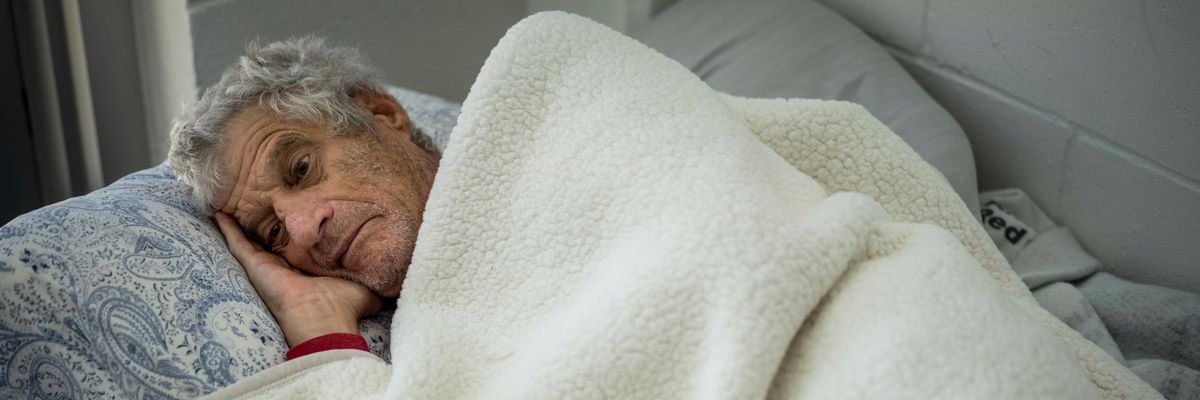In Florida, Hurricane Ian ripped homes from their foundations, mangled boat docks and left at least 2.6 million people without power. Floridians shared pictures of flamingos sheltering from the storm in public bathrooms and sharks swimming up the flooded streets.
Welcome to the age of climate change.
As we assess the devastating effects of Hurricane Ian, it's time to take a closer look at climate adaptation. How ready are we for the climate impacts that are here now and are on track to become scarily worse?
Clean energy powered micro-grids with battery storage will prove not only to be a cost-effective way to reduce carbon pollution, but they would also make us more resilient in the face of climate disasters.
The age of climate change
Since the late 1980s, scientists have been warning the public with dire predictions of how our climate will change in a warming world, yet it always felt like a far-off threat in the distant future. Surely, we collectively assumed, given the alarming predictions, society would get its act together to avoid such a hellish nightmare of a future.
But we didn't, and now the hellish nightmare is here.
Category 4 Hurricane Ian slammed into Florida with up to 150 mph winds making it the fifth strongest hurricane to hit the continental U.S. in history.
That's after it devastated Cuba days prior, knocking out the entire island's power grid, leaving 11 million people in the dark. Not surprisingly, protests are erupting from Cubans in need of power, food and aid.
This storm hit less than two weeks after Hurricane Fiona slammed into Puerto Rico leaving 3.3 million people without power.
Before the hurricanes came a month of floods. In August, 35 people were killed in extreme floods in Kentucky.
Record-setting rains in Jackson, Mississippi, flooded the water-treatment plant leaving 60,000 people without access to running water. Historic underinvestment in Jackson due to "racist funding policies," according to the NAACP president, set the stage for this calamity.
Historic floods in Pakistan put one-third of the country under water, impacting 33 million people and displacing 8 million. The flooding doesn't look like it will recede for 6 months. Yet, somehow this was just a blip on the news, quickly forgotten, like many disasters. Notably, Pakistan has contributed less than 1 percent of historic global carbon emissions.
The list of disasters goes on and on: 400,000 people were displaced in Vietnam this week after Typhoon Noru. China is in the midst of its worst drought on record. California hasn't been this dry in 1,200 years. Over 18 million people in the Horn of Africa face hunger due to an unprecedented drought and crop failure.
The magnitude of the threat to human life and how this confluence of crises will play out is nothing short of terrifying.
Sadly, this is what a warming world looks like at just 1.2 degrees Celsius. While the nations of the world agreed to try and limit warming to 1.5 degrees Celsius, current policies set us on the path to 2.7 degrees Celsius.
Mitigation
Now, before we throw our hands up and declare it the end of days, know this: We can turn this around if we act swiftly.
World-renowned climate scientist Michael Mann of Penn State and his team explain the latest scientific understanding, noting scientists believed "that even if humanity hypothetically halted all heat-trapping emissions overnight, carbon dioxide's long lifetime in the atmosphere ... would ... keep global temperatures rising for 30 to 40 more years. ... But guided by subsequent research, scientists dramatically revised that lag time estimate down to as little as three to five years. ... This revised science means that if humanity slashes emissions to zero, global temperatures will stop rising almost immediately."
Given that solar energy is now the cheapest form of electricity in history, according to the International Energy Agency, things are starting to look up. A recent study from Oxford found that a swift transition to renewable energy will allow us to decarbonize the economy by 2050 and save $12 trillion in the process.
Adaptation
But climate impacts are here today. We need to double down on climate adaptation now.
Ideally, the fossil fuel companies that have admitted to deceiving the public on climate should be paying for mitigation and adaptation measures around the world. While there are over 20 climate lawsuits against fossil fuel companies, we don't have time to wait for the verdict.
We must start building resilience right away. Clean energy powered micro-grids with battery storage will prove not only to be a cost-effective way to reduce carbon pollution, but they would also make us more resilient in the face of climate disasters.
In Jackson, Mississippi, a nonprofit organization called 501CTHREE has set up portable water-filtration "water boxes" at community centers, providing clean water for residents, a solution they pioneered in Flint, Michigan. These are the types of community-based solutions we need in place today -- before the next disaster hits.
But first, we must acknowledge that we have a problem. A recent study found that the majority of Americans (66 to 80 percent) favor strong climate action. However, when the same people were asked how many other Americans shared their view, they incorrectly believed it was only around 40 percent. How absurd. Here we are all sitting at home worrying about climate change, thinking we're the only ones, when in fact the vast majority of us want to see change.
To coordinate mitigation and adaptation efforts at scale, we have to unflinchingly look climate change in the face, call it what it is and start talking to each other about it. As one headline of an Esquire article recently put it, "In the End, Climate Change Is the Only Story That Matters."




